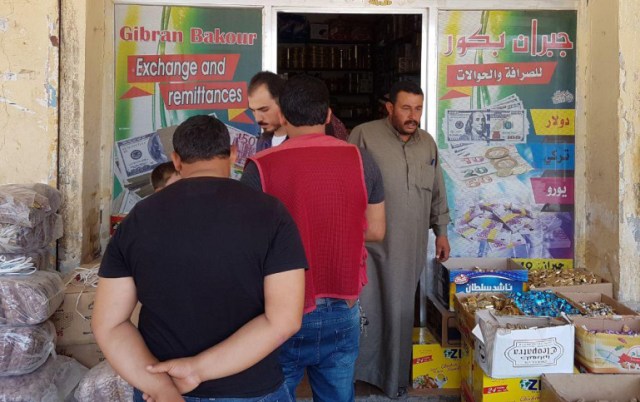With the rapid collapse of the value of the Syrian pound, the opposition in northern Syria is working to find alternatives and solutions to redress the chaos in the markets, due to the huge rise in prices of goods and commodities.
Among the alternatives is the offering of replacing the Syrian pound with Turkish in commercial transactions, as well as dealing in dollars, while this option faces major challenges.
After the exchange rate of one dollar exceeded the barrier of 3 thousand Syrian pounds and the price fluctuated, a number of traders closed their shops in the countryside of Aleppo, while the majority of them approved the Turkish lira and the dollar in buying and selling.
Although the idea of replacing the Syrian currency with Turkish in opposition-controlled areas is not new, and it has been raised on previous occasions, it has not been widely implemented.
The unprecedented collapse in the value of the Syrian pound since the beginning of this June has prompted the opposition and local councils to expressly call for the circulation of the Turkish lira, and for the pricing of basic food items such as bread, in addition to gold prices.
In the city of Marea in Aleppo countryside, the local council rushed to issue a statement calling on merchants and residents to fix prices in the Turkish lira, and the use of the dollar in large sales, fearing the accelerating collapse in the value of the Syrian pound and the imbalance in trade agreements, according to his description.
"All transactions with the institutions of the interim government will be in Turkish lira or dollars. For example, the Grain Foundation buys wheat and sells flour in dollars. As for bread, it will be sold in Turkish lira," says Abdel-Hakim al-Masri, the Syrian Minister of Economy.
Al-Masry adds to Al-Jazeera Net that the interim government has begun the process of replacing the Syrian pound with more stable currencies after the heavy losses suffered, indicating at the same time that an official decision has not been issued so far.
Regarding the consequences of the move and the extent of its success in the Syrian north, the Egyptian sees that any new work is difficult in its beginning, but the substitution has become a collective demand, especially from workers who receive their wages in the Syrian currency so that the wages are fixed according to the Turkish lira, and also the traders who incurred huge losses and closed Their stores due to the difference in the value of the currency.
He points out that the current circulation of the Turkish lira maintains the region's economic stability and purchasing power, and protects shop owners from the repercussions of the deterioration of the Syrian pound in the buying and selling operations.
Currency infusion
Meanwhile, the Turkish post centers deployed in the countryside of Aleppo, northern Syria, started to pump quantities of small categories of cash from the Turkish currency, from the value of one lira, 5 and 10 pounds, in order to provide them to civilians and use them in daily transactions in the markets.
This action comes after calls from local councils of people to trade the Turkish lira after the acceleration of the depreciation of the Syrian pound.
Abdul Karim Muhammed - who is from the countryside of Aleppo countryside - describes the circulation of the Turkish lira as the best solutions offered and currently available in the opposition areas, but unfortunately most of the currency exchanges receive an unacceptable profit margin to exchange the Syrian currency to the people and give them the Turkish currency.
Abdel Karim adds to Al-Jazeera Net that despite the circulation of the Turkish lira, the people have not been used until the moment to use it, especially the small cash categories, but the procedure was the best of both.
The Syrian economic advisor, Osama Qazi, proposes that goods and commodities be priced in two Syrian national and Turkish currencies, or a dollar, a measure that countries usually take when the currency loses its value and enters into the stage of hyperinflation.
He added, "As it is clear, the Syrian economy has escaped from its head, and inflation has become 50% within a month, and it is outside the control of the Syrian Central Bank."
Qazi gave an example of the collapse of the national currency in Lebanon and Venezuela previously, as traders deliberately priced two currencies, in order to return to the national currency after the return of political stability in Syria.
Judge believes that Turkey has a large duty now, and it is important for the Turkish government to pump at least half a billion Turkish liras per month, in order to create job opportunities in the presence of one administration, which is the Syrian interim government and police that control prices at the cashiers.

